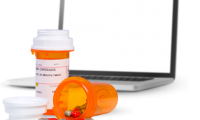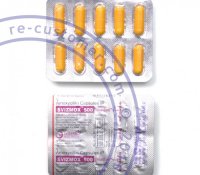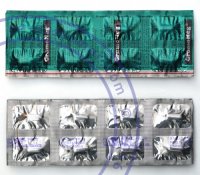 Most of us in times of illness seek salvation in antibiotics, often — without prior consultation with a medical professional. Their incredible ability to effectively fight many diseases and kill infections is so appealing to us that we begin to take them whenever there is a health hazard. This ultimately, can lead to not the most favorable consequences. So, let's figure out how to use antibiotics properly, this will help us take care of our health competently.
Most of us in times of illness seek salvation in antibiotics, often — without prior consultation with a medical professional. Their incredible ability to effectively fight many diseases and kill infections is so appealing to us that we begin to take them whenever there is a health hazard. This ultimately, can lead to not the most favorable consequences. So, let's figure out how to use antibiotics properly, this will help us take care of our health competently.
The first and main rule is no self-treatment! This applies to all those who do not have a few years of training in a medical college and a few more years of therapeutic practice behind their backs. If we could do with only reading of the instructions to the drugs and searching for reviews on the Internet, doctors would not have to contend with the complications of many quite harmless diseases. This doesn’t mean that you can’t rely on instructions to medical products or that you can use Spain online pharmacies if you want to save on purchasing medications. It just means that you always should get your physician’s permission before taking any medication. Also a medical professional is able to explain you in the best way when and how to use antibiotics.
Do not insist on appointing you the "strongest" antibiotic. Give your immunity the opportunity to do what is in its power. Otherwise, the organism will continue to rely on outside help and will simply forget how to deal with harmful infections on its own. In addition, strong antibiotics kill all microorganisms in their path, including useful ones.
Any illness itself is a great stress for the organism, but, strangely enough, antibiotic use is a no less easier experience. Along with pathogenic bacteria the organism loses many useful bacteria necessary for normal functioning, plus antibiotics often provoke allergic reactions. From what has been said above, it follows that:
- It will be useful to pass an allergy test for susceptibility to medications
- Parallel reception of antihistamines (antiallergic) medicines, as well as probiotics — products designed to fill the loss of useful intestinal microflora will help to sustain a double load to the body. Sour-milk products are able to help coping with indigestion caused by antibiotics. If they are not part of your normal diet, try to drink them at least 1-2 weeks after a course of antibiotics. But again, only agreeing such a thing with your health care provider
Fatty, fried, smoked, canned foods, alcoholic beverages and sour fruits — all this is a serious work for the liver and digestive system of even a completely healthy person. Therefore, you should exclude them from your diet at least for a while. Give preference to easily digestible products, such as porridges, cooked or stewed vegetables and white bread.
Watch your health during the course of treatment with antibiotics. Your condition should begin to change for the better within 3 days. If this did not happen but you’ve been using antibiotics correctly — you should probably switch to another antibiotic.
The next rule is VERY important. If you started to use an antibiotic, and everything went well, and now you have neither fever with a cough, nor weakness and headache, this means that you need to... continue to take the prescribed antibiotic. It is necessary to complete the full course of the medicine; usually it lasts from 5 to 10 days (the duration is determined by the attending physician). Antibiotics are nothing like pills for stomach pain, which you can stop taking as soon as the pain goes away. The fact that the symptoms of the disease have weakened means that the microorganisms that cause them also weakened. But weakened does not mean dead. There are always a number of particularly persistent bacteria that are just waiting for the moment you stop treatment so they could start multiplying again. This is how, by the way, the notorious resistance of modern infections to old medicines is being formed.
For the same reason, it is not recommended to experiment with dosage, periodicity and frequency of reception. Many, trying to avoid side effects, arbitrarily reduce the dosage in two or even three times, thus contributing to bacteria resistance.
Like many other medicines, antibiotics are taken at regular intervals. How long do these intervals last? It depends on the number of times a day when you need to take an antibiotic. If 4 times a day — then every 6 hours, 1 time — every day strictly at the same time. The formula is very simple: 24 hours divided by the number of medications. You need to adhere to this rule even in the nighttime. This is done to maintain the same concentration of antibiotic in the blood. You want to use antibiotics effectively, so do anything that can contribute to its speedy action.
The same antibiotic might not help with exactly the same illness in the same person. As we already know, bacteria quickly adapt to the antibiotic and when an antibiotic is reassigned, it may not be effective to them. Let’s say Neggram (a very effective antibiotic) helped you last year, but it might be powerless to deal with the same illness now.
Each medical product has its own characteristics, so carefully read the instructions. Some antibiotics are better taken before meals, and some, for example, tetracyclines, cannot be combined with milk. Generally, it is recommended to wash down antibiotics with pure non-carbonated water. Juices are also forbidden: the orthophosphoric acid contained therein may react with the ingredients of medicines, and in some cases this may result in poisoning. Some antibiotics, oddly enough, can increase your sensitivity to the sun, so while using them you shouldn’t sunbathe or use a tanning both. This should also be indicated in the instruction, so that you pay attention to such small details if you want to use antibiotics safely.
And finally, a little recommendation: when taking antibiotics, be prepared for the fact that for some time you will be sweating intensely. Therefore, in the when choosing clothing, preference should be given to natural fabrics, and in every possible way beware of wind and drafts.





